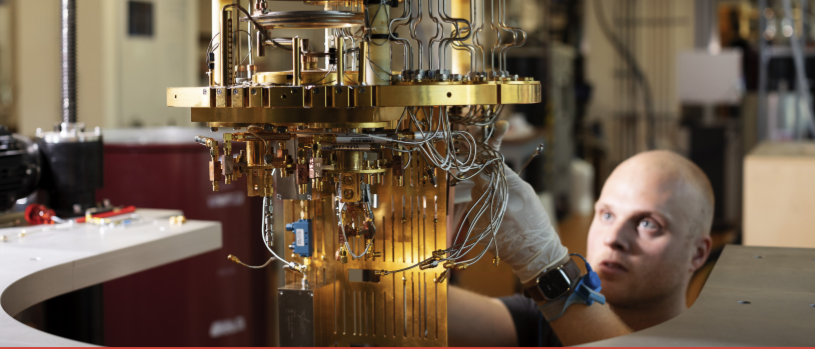Minor Quantum Science and Quantum Information
Take the most exciting journey in the quantum world and discover its spectacular potential! Ready for the challenge?
As a bachelor student from (Applied) Physics, Electrical Engineer, (Applied) Mathematics, or Computer Science at Delft University of Technology and other universities, you can participate in the Quantum Science and Quantum Information (QSQI) minor. In this minor, you’ll get to familiarize yourself with developments in the field of quantum science, quantum technology and quantum devices, and with practical applications arising from research in this multidisciplinary field. Experience the quantum world and get fascinated by its concepts!
The quantum world is full of magic: particles can be in two different states at the same time, they influence each other instantaneously even when they are light years apart. The fascination for quantum physics lies in its magic and in its potential. Quantum mechanics imposes fundamental limits on the precision with which we can measure values of physical quantities.
A world which is so vastly different from the one we experience in our daily lives offers functionalities which go far beyond those offered by classical physics. One such functionality is fully safe communication, another is the quantum computer. The limitations manifest themselves in detectors: here a challenge is to reach the uncertainty limit imposed by quantum mechanics.
Register now!
Click and follow the instructions to register.
Requirements
Participation in the QSQI minor is open to students from BSc programmes of (Applied) Physics, Electrical Engineering, (Applied) Mathematics, and Computer Science at Delft University of Technology and other universities.
This requires your full commitment: we expect you to complete the minor within one academic year.
Prior knowledge
This minor is challenging and is only intended for students with a strong background in calculus and linear algebra. We strongly advise against taking it if your average mark for the calculus and algebra courses in your programme is not well above 7.
(Applied) Physics students must have completed the regular second year quantum mechanics courses.
Goal
The goal of the minor is to familiarize students with developments in the field of quantum science, quantum technology and quantum devices, and with practical applications arising from research in this multidisciplinary field. This implies a broadening of the knowledge of the students, combined with research experience in this modern field.
After successful completion of the minor:
The student possesses sufficient knowledge of the field of quantum theory, together with the necessary mathematics and electromagnetism, to participate in basic quantum research and to follow specialised courses in the field of quantum science and engineering. The student has knowledge of the realisation of quantum devices.
- The student has knowledge of and experience in research in the field of quantum science, in particular quantum information.
- The student is aware of the implications of quantum technology and is capable of forming informed opinions on this and able to defend these.
- The student has experience in carrying out project work in groups.
- The student has an overview of recent developments in the field of quantum science, technology and information and of the prospects for the near future, and is capable of reflecting on these.
Programme Overview
The minor consists of an integrated set of course modules combined with a final project, in which students work in small groups on the design, hardware and/or software components of a quantum device to apply their newly attained skills.
- The number of contact hours is 16-20 hours a week.
- Fulltime availability is required for the group project in January.
- Timetabling of the course modules is based on four periods in the semester.
Faculty of Applied Sciences
ECTS: 30
Language: English
Maximum participants: 60
Non-selection minor
Criteria: we strongly advise against taking it if your average mark for the calculus and algebra courses in your programme is not well above 7.
Modules
| TN3105 | Mathematics for Quantum Physics | 2 ECTS | All students |
| TN3126 | Information and Computing | 5 ECTS | AS Students |
| TN3136 | Quantum Physics | 5 ECTS | EEMCS students |
| TN3145 | Quantum Communication and Computation | 4 ECTS | All students |
| TN3156 | Quantum Sensing and Measurement | 4 ECTS | All students |
| TN3166 | Solid-State Quantum Bits (consisting of Semiconductor Quantum Bits, and Superconductor Quantum Bits) | 9 ECTS | All students |
| TN3175 | Quantum Engineering Group Project | 6 ECTS | All students |
Contact
If you have any questions about the programme, please do not hesitate to contact the minor coordinator.
Minor Coordinator : Arno Haket – Minor-QSQI-TNW@tudelft.nl
Programme Director : Jos Thijssen – Minor-QSQI-TNW@tudelft.nl
QuTech Academy : Menno Veldhorst – Minor-QSQI-TNW@tudelft.nl
International exchange students: please contact the international office of the faculty of Applied Sciences for additional information: InternationalOffice-TNW@tudelft.nl

